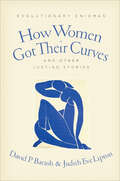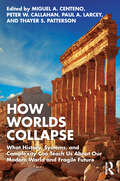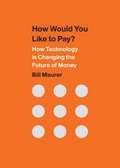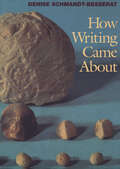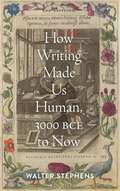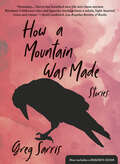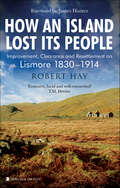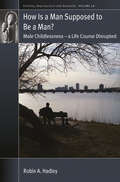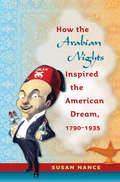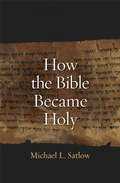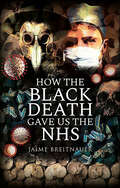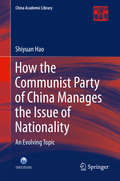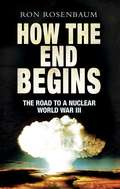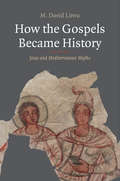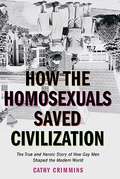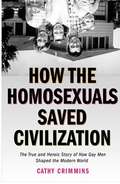- Table View
- List View
How Women Got Their Curves and Other Just-So Stories: Evolutionary Enigmas
by Judith Eve Lipton David P BarashThe authors of Gender Gap: The Biology of Male-Female Differences take readers on &“a joyride of intellectual discovery . . . full of provocative ideas&” (Pepper Schwartz, author of Prime). So how did women get their curves? Why do they have breasts, while other mammals only develop breast tissue while lactating, and why do women menstruate, when virtually no other beings do so? What are the reasons for female orgasm? Why are human females kept in the dark about their own time of ovulation and maximum fertility, and why are they the only animals to experience menopause? David P. Barash and Judith Eve Lipton, coauthors of acclaimed books on human sexuality and gender, discuss the theories scientists have advanced to explain these evolutionary enigmas (sometimes called &“Just-So stories&” by their detractors) and present hypotheses of their own. Some scientific theories are based on legitimate empirical data, while others are pure speculation. Barash and Lipton distinguish between what is solid and what remains uncertain, skillfully incorporating their expert knowledge of biology, psychology, animal behavior, anthropology, and human sexuality into their entertaining critiques. Inviting readers to examine the evidence and draw their own conclusions, Barash and Lipton tell an evolutionary suspense story that captures the excitement and thrill of true scientific detection. &“A delightful, thought-provoking volume on perennial questions about female biology . . . Along the way, they present a large amount of accessible information about biology, psychology, physiology and anatomy. Even more important, they demonstrate how scientists work to create and assess hypotheses while having a great deal of fun.&”—Publishers Weekly
How Worlds Collapse: What History, Systems, and Complexity Can Teach Us About Our Modern World and Fragile Future
by Miguel A. Centeno, Peter W. Callahan, Paul A. Larcey, Thayer S. PattersonAs our society confronts the impacts of globalization and global systemic risks—such as financial contagion, climate change, and epidemics—what can studies of the past tell us about our present and future? How Worlds Collapse offers case studies of societies that either collapsed or overcame cataclysmic adversity. The authors in this volume find commonalities between past civilizations and our current society, tracing patterns, strategies, and early warning signs that can inform decision-making today. While today’s world presents unique challenges, many mechanisms, dynamics, and fundamental challenges to the foundations of civilization have been consistent throughout history—highlighting essential lessons for the future.
How Would You Like to Pay?: How Technology Is Changing the Future of Money
by Bill MaurerFrom Bitcoin to Apple Pay, big changes seem to be afoot in the world of money. Yet the use of coins and paper bills has persisted for 3,000 years. In How Would You Like to Pay?, leading anthropologist Bill Maurer narrates money's history, considers its role in everyday life, and discusses the implications of how new technologies are changing how we pay. These changes are especially important in the developing world, where people who lack access to banks are using cell phones in creative ways to send and save money. To truly understand money, Maurer explains, is to understand and appreciate the complex infrastructures and social relationships it relies on. Engaging and straightforward, How Would You Like to Pay? rethinks something so familiar and fundamental in new and exciting ways. Ultimately, considering how we would like to pay gives insights into determining how we would like to live.
How Would You Rule?: Legal Puzzles, Brainteasers, and Dilemmas from the Law's Strangest Cases
by Daniel W. ParkHow Would You Rule is a lighthearted introduction to fundamental concepts of law through strange but true legal cases. Each chapter tells the story of a different case and presents the main arguments of the opposing parties. The twist? Before the ruling of the court is revealed, readers are challenged to put themselves in the shoes--or the robes--of the judges and decide for themselves how they would rule in these cases. After coming up with their own solutions, readers can learn how the actual judges resolved the disputes. The goal is to get readers to think for themselves about what's right and what's wrong, sharpening their own instincts for the reasons and analyses that win arguments.
How Writing Came About
by Denise Schmandt-BesseratIn 1992, the University of Texas Press published Before Writing, Volume I: From Counting to Cuneiform and Before Writing, Volume II: A Catalog of Near Eastern Tokens. In these two volumes, Denise Schmandt-Besserat set forth her groundbreaking theory that the cuneiform script invented in the Near East in the late fourth millennium B. C. -the world's oldest known system of writing-derived from an archaic counting device. How Writing Came About draws material from both volumes to present Schmandt-Besserat's theory for a wide public and classroom audience. Based on the analysis and interpretation of a selection of 8,000 tokens or counters from 116 sites in Iran, Iraq, the Levant, and Turkey, it documents the immediate precursor of the cuneiform script.
How Writing Came About
by Denise Schmandt-BesseratAn &“utterly lucid, thoughtfully illustrated, and thoroughly convincing&” book on the origins of the world&’s oldest known system of writing (American Journal of Archaeology). One of American Scientist&’s Top 100 Books on Science, 2001 In 1992, the University of Texas Press published Before Writing, Volume I: From Counting to Cuneiform and Before Writing, Volume II: A Catalog of Near Eastern Tokens. In these two volumes, Denise Schmandt-Besserat set forth her groundbreaking theory that the cuneiform script invented in the Near East in the late fourth millennium B.C.—the world's oldest known system of writing—derived from an archaic counting device. How Writing Came About draws material from both volumes of this scholarly work to present Schmandt-Besserat&’s theory in an abridged version for a wide public and classroom audience. Based on the analysis and interpretation of a selection of 8,000 tokens or counters from 116 sites in Iran, Iraq, the Levant, and Turkey, it documents the immediate precursor of the cuneiform script.
How You Get Famous: Ten Years of Drag Madness in Brooklyn
by Nicole PasulkaA madcap adventure through a tight-knit world of drag performers making art and mayhem in the greatest city on earth.Ten years ago, an aimless coat check girl better known today as Merrie Cherry sweet-talked her boss into giving her $100 to host a drag show at a Brooklyn dive bar. Soon, kids like Aja were kicking their way into the scene, sneaking into clubs, pocketing their tips to help mom pay the mortgage, and sharing the stage with electric performers like Thorgy Thor and Sasha Velour. Because suddenly, in the biggest, brightest city in America, drag was offering young, broke, creative queer people a chance at real money—and for thousands or even millions of people to learn their names. In How You Get Famous, journalist Nicole Pasulka joyfully documents the rebirth of the New York drag scene, following a group of iconoclastic performers with undeniable charisma, talent, and a hell of a lot to prove. The result is a sweeping portrait of the 21st-century search for celebrity and community, as well as a chronicle of all the struggles, fights, and disappointments along the way. A rollicking account of the quest to make a living through an art form on the cusp of becoming a cultural phenomenon, How You Get Famous offers an unmissable romp through the gritty and glamorous world of Brooklyn drag.
How a Mountain Was Made: Stories
by Greg SarrisIn the tradition of Calvino's Italian Folktales, Greg Sarris, author of the award-winning novel Grand Avenue, turns his attention to his ancestral homeland of Sonoma Mountain in Northern California. In sixteen interconnected original stories, the twin crows Question Woman and Answer Woman take us through a world unlike yet oddly reminiscent of our own: one which blooms bright with poppies, lupines, and clover; one in which Waterbug kidnaps an entire creek; in which songs have the power to enchant; in which Rain is a beautiful woman who keeps people's memories in stones. Inspired by traditional Coast Miwok and Southern Pomo creation tales, these stories are timeless in their wisdom and beauty, and because of this timelessness their messages are vital and immediate. The figures in these stories ponder the meaning of leadership, of their place within the landscape and their community. In these stories we find a model for how we can all come home again. At once ancient and contemporary, How a Mountain Was Made is equally at home in modern letters as the ancient story cycle. Sarris infuses his stories with a prose stylist's creativity and inventiveness, moving American Indian literature in a new and emergent direction.
How an Island Lost Its People: Improvement, Clearance and Resettlement on Lismore 1830–1914
by Robert HayIn 1830, the little Hebridean island of Lismore was one of the granaries of the West Highlands, with every possible scrap of land producing bere barley or oats. The population had reached its peak of 1500, but by 1910, numbers had dwindled to 400 and were still falling. The agricultural economy had been almost completely transformed to support sheep and cattle, with ploughland replaced by the now familiar green grassy landscape. With reference to documentary sources, including Poor Law reports, the report of the Napier Commission into the condition crofters in the Highlands and Islands, as well as local documents and letters, this book documents a century of emigration, migration and clearance and paints an intimate portrait of the island community during a period of profound change. At the same time, it also celebrates the achievements of the many tenants who grasped the opportunities involved in agricultural improvement.
How is a Man Supposed to be a Man?: Male Childlessness – a Life Course Disrupted (Fertility, Reproduction and Sexuality: Social and Cultural Perspectives #48)
by Robin A HadleyThe global trend of declining fertility rates and an increasingly ageing population has serious implications for individuals and institutions alike. Childless men are mostly excluded from ageing, social science and reproduction scholarship and almost completely absent from most national statistics. This unique book examines the lived experiences of a hidden and disenfranchised population: men who wanted to be fathers. It explores the complex intersections that influence childlessness over the life course.
How is a Man Supposed to be a Man?: Male Childlessness – a Life Course Disrupted (Fertility, Reproduction and Sexuality: Social and Cultural Perspectives #48)
by Robin A HadleyThe global trend of declining fertility rates and an increasingly ageing population has serious implications for individuals and institutions alike. Childless men are mostly excluded from ageing, social science and reproduction scholarship and almost completely absent from most national statistics. This unique book examines the lived experiences of a hidden and disenfranchised population: men who wanted to be fathers. It explores the complex intersections that influence childlessness over the life course.
How the Arabian Nights Inspired the American Dream, 1790-1935
by Susan NanceAmericans have always shown a fascination with the people, customs, and legends of the "East"--witness the popularity of the stories of theArabian Nights, the performances of Arab belly dancers and acrobats, the feats of turban-wearing vaudeville magicians, and even the antics of fez-topped Shriners. In this captivating volume, Susan Nance provides a social and cultural history of this highly popular genre of Easternized performance in America up to the Great Depression. According to Nance, these traditions reveal how a broad spectrum of Americans, including recent immigrants and impersonators, behaved as producers and consumers in a rapidly developing capitalist economy. In admiration of theArabian Nights, people creatively reenacted Eastern life, but these performances were also demonstrations of Americans' own identities, Nance argues. The story of Aladdin, made suddenly rich by rubbing an old lamp, stood as a particularly apt metaphor for how consumer capitalism might benefit each person. The leisure, abundance, and contentment that many imagined were typical of Eastern life were the same characteristics used to define "the American dream. " The recent success of Disney'sAladdinmovies suggests that many Americans still welcome an interpretation of the East as a site of incredible riches, romance, and happy endings. This abundantly illustrated account is the first by a historian to explain why and how so many Americans sought out such cultural engagement with the Eastern world long before geopolitical concerns became paramount.
How the Bible Became Holy
by Michael L SatlowBeginning with Walt Whitman singing hymns at a wounded soldier's bedside during the Civil War, this surprising and vivid anthology ranges straight through to the twenty-first century to end with Francine Prose crying tears of complicated joy at the sight of Whitman's words in Zuccotti Park during the brief days of the Occupy movement. The first anthology of its kind, Radiant Truths gathers an exquisite selection of writings by both well-known and forgotten American authors and thinkers, each engaged in the challenges of writing about religion, of documenting "things unseen." Their contributions to the genre of literary journalism-the telling of factual stories using the techniques of fiction and poetry-make this volume one of the most exciting anthologies of creative nonfiction to have emerged in years. Jeff Sharlet presents an evocative selection of writings that illuminate the evolution of the American genre of documentary prose. Each entry may be savored separately, but together the works enrich one another, engaging in an implicit and continuing conversation that reaches across time and generations.Including works by: Walt Whitman Henry David Thoreau Mark Twain Meridel Le Sueur Zora Neale Hurston Mary McCarthy James Baldwin Norman Mailer Ellen Willis Anne Fadiman John Jeremiah Sullivan Francine Prose Garry Wills and many others
How the Black Death Gave Us the NHS
by Jaime BreitnauerAs the world is gripped by the coronavirus pandemic, all eyes in the UK have been on our NHS heroes. But where did they come from? Why do we have such a unique free at the point of use healthcare system? How has this benefitted British society? And how does healthcare in other countries work? Going back to pre-history, we will take a look at epidemics and pandemics through the ages and how they have consistently nudged healthcare policy toward a more social model. They say a measure of civilised society is how it provides for its citizens, and the NHS has been the backbone of Great Britain for the best part of a century. As well as looking at its origins and counterparts in other countries, we will take a look at how the Covid-19 pandemic has been handled, and what the future of social healthcare might be across the globe.
How the Clinic Made Gender: The Medical History of a Transformative Idea
by Sandra EderAn eye-opening exploration of the medical origins of gender in modern US history. Today, a world without “gender” is hard to imagine. Gender is at the center of contentious political and social debates, shapes policy decisions, and informs our everyday lives. Its formulation, however, is lesser known: Gender was first used in clinical practice. This book tells the story of the invention of gender in American medicine, detailing how it was shaped by mid-twentieth-century American notions of culture, personality, and social engineering. Sandra Eder shows how the concept of gender transformed from a pragmatic tool in the sex assignment of children with intersex traits in the 1950s to an essential category in clinics for transgender individuals in the 1960s. Following gender outside the clinic, she reconstructs the variable ways feminists integrated gender into their theories and practices in the 1970s. The process by which ideas about gender became medicalized, enforced, and popularized was messy, and the route by which gender came to be understood and applied through the treatment of patients with intersex traits was fraught and contested. In historicizing the emergence of the sex/gender binary, Eder reveals the role of medical practice in developing a transformative idea and the interdependence between practice and wider social norms that inform the attitudes of physicians and researchers. She shows that ideas like gender can take on a life of their own and may be used to question the normative perceptions they were based on. Illuminating and deeply researched, the book closes a notable gap in the history of gender and will inspire current debates on the relationship between social norms and medical practice.
How the Clinic Made Gender: The Medical History of a Transformative Idea
by Sandra EderAn eye-opening exploration of the medical origins of gender in modern US history. Today, a world without “gender” is hard to imagine. Gender is at the center of contentious political and social debates, shapes policy decisions, and informs our everyday lives. Its formulation, however, is lesser known: Gender was first used in clinical practice. This book tells the story of the invention of gender in American medicine, detailing how it was shaped by mid-twentieth-century American notions of culture, personality, and social engineering. Sandra Eder shows how the concept of gender transformed from a pragmatic tool in the sex assignment of children with intersex traits in the 1950s to an essential category in clinics for transgender individuals in the 1960s. Following gender outside the clinic, she reconstructs the variable ways feminists integrated gender into their theories and practices in the 1970s. The process by which ideas about gender became medicalized, enforced, and popularized was messy, and the route by which gender came to be understood and applied through the treatment of patients with intersex traits was fraught and contested. In historicizing the emergence of the sex/gender binary, Eder reveals the role of medical practice in developing a transformative idea and the interdependence between practice and wider social norms that inform the attitudes of physicians and researchers. She shows that ideas like gender can take on a life of their own and may be used to question the normative perceptions they were based on. Illuminating and deeply researched, the book closes a notable gap in the history of gender and will inspire current debates on the relationship between social norms and medical practice.
How the Clinic Made Gender: The Medical History of a Transformative Idea
by Sandra EderAn eye-opening exploration of the medical origins of gender in modern US history. Today, a world without “gender” is hard to imagine. Gender is at the center of contentious political and social debates, shapes policy decisions, and informs our everyday lives. Its formulation, however, is lesser known: Gender was first used in clinical practice. This book tells the story of the invention of gender in American medicine, detailing how it was shaped by mid-twentieth-century American notions of culture, personality, and social engineering. Sandra Eder shows how the concept of gender transformed from a pragmatic tool in the sex assignment of children with intersex traits in the 1950s to an essential category in clinics for transgender individuals in the 1960s. Following gender outside the clinic, she reconstructs the variable ways feminists integrated gender into their theories and practices in the 1970s. The process by which ideas about gender became medicalized, enforced, and popularized was messy, and the route by which gender came to be understood and applied through the treatment of patients with intersex traits was fraught and contested. In historicizing the emergence of the sex/gender binary, Eder reveals the role of medical practice in developing a transformative idea and the interdependence between practice and wider social norms that inform the attitudes of physicians and researchers. She shows that ideas like gender can take on a life of their own and may be used to question the normative perceptions they were based on. Illuminating and deeply researched, the book closes a notable gap in the history of gender and will inspire current debates on the relationship between social norms and medical practice.
How the Communist Party of China Manages the Issue of Nationality
by Shiyuan HaoThis book introduces the background of China's issue of nationality from the very beginning. Throughout the country's history, all the nationalities that lived and prospered on Chinese land created a pattern of cultural diversity within national unity through their interaction and integration. The formation of this pattern is due not only to the geographical fact that China covers a broad expanse on the Asian continent but also to the historical fact that it is home to disparate and ancient human heritages, and to culturally diverse historical sources. The book's five chapters explain the evolution of the CPC's policy towards nationalities. At the time of the PRC's founding, the Common Program (in essence an interim Constitution) passed by the Chinese People's Political Consultative Congress (which was composed of people from all sectors of society and all of China's nationalities) not only declared that people of all China's nationalities had equal rights, but also stipulated that: regional national autonomy would be practiced in all areas where minority nationalities were concentrated; that all nationalities had the right to develop their native languages and culture and to maintain or reform their customs and religious beliefs; and also mandated that people's governments support the development of minority nati onalities in the areas of politics, the economy, culture and education. In the final section, the book demonstrates that the subject of how the CPC addresses nationality-related issues is a dynamic one that encompasses the past, present and future, and is simultaneously an answer, a process and a question.
How the Cross Became a Sword
by Richard BookerThis publication explains the events that separated Christianity from its Jewish roots and established anti-Semitism as official church doctrine.
How the End Begins: The Road to a Nuclear World War III
by Ron RosenbaumEach chapter of the How the World Ends deconstructs the dangers we face. Rosenbaum begins by showing all the ways the post-Cold War order that tried to impose a set of rules of averting a nuclear mistake has fallen apart. In chapter 2, he describes the journey of one Bruce Blair, once a missile launcher, whose experience inside the nuclear establishment left him alarmed about its vulnerabilities. Chapter 3 looks at nuclear war from the Russian side, using the architect of that nation's early warning system as a focus. Chapter 4 looks at how the Bush Administration helped pushed the world closer to a nuclear conflict by rewriting the rules of deterrence. Chapter 5 describes all the ways the international incidents we have seen - Georgia, the Israeli raid on Syria, the Iranian moves - are evidence that some governments have shown a willingness to move closer to the brink of a conflict involving nuclear weapons. The rest of the book looks at the broader nuclear issues facing the world in the 21st century: What is deterrence? Who can claim to have it? How many nuclear weapons can we live with? Is zero really possible? In other words: Can we undream the nightmare?
How the French Invented Love: Nine Hundred Years of Passion and Romance
by Marilyn Yalom“Absolutely marvelous…lively and learned….Marilyn Yalom’s book is a distinguished contribution to our experience of a great literature, as well as an endearing memoir.” —Diane Johnson, author of Lulu in Marrakech and Le Divorce“[An] enchanting tour of French literature—from Abelard and Heloise in the 12th century to Marguerite Duras in the 20th and Philippe Sollers in the 21st.” —Publishers Weekly (starred review)How the French Invented Love is an entertaining and masterful history of love à la française by acclaimed scholar Marilyn Yalom. Spanning the Middle Ages to the present, Yalom explores a love-obsessed culture through its great works of literature—from Moliere’s comic love to the tragic love of Racine, from the existential love of Simone de Beauvoir and Jean-Paul Sartre to the romanticism of George Sand and Alfred de Musset. A thoroughly engaging homage to French culture and literature interlaced with the author’s delicious personal anecdotes, How the French Invented Love is ideal for fans of Alain de Botton, Adam Gopnik, and Simon Schama.
How the Gospels Became History: Jesus and Mediterranean Myths (Synkrisis)
by M. David LitwaA compelling comparison of the gospels and Greco-Roman mythology which shows that the gospels were not perceived as myths, but as historical records Did the early Christians believe their myths? Like most ancient—and modern—people, early Christians made efforts to present their myths in the most believable ways. In this eye-opening work, M. David Litwa explores how and why what later became the four canonical gospels take on a historical cast that remains vitally important for many Christians today. Offering an in-depth comparison with other Greco-Roman stories that have been shaped to seem like history, Litwa shows how the evangelists responded to the pressures of Greco-Roman literary culture by using well-known historiographical tropes such as the mention of famous rulers and kings, geographical notices, the introduction of eyewitnesses, vivid presentation, alternative reports, and so on. In this way, the evangelists deliberately shaped myths about Jesus into historical discourse to maximize their believability for ancient audiences.
How the Homosexuals Saved Civilization: The Time and Heroic Story of How Gay Men Shaped the Modern World
by Cathy CrimminsA shrewd and irreverent cultural history of the customs, fashions, and figures of gay life in the twentieth and the early twenty-first centuries-and how they have changed all of us for the better. <P> The "global queering" of America has been gradually shaping the way straight people talk, think, dress, and eat. Over the past fifty years, the line between what is "straight" and what is "gay" has blurred to the point that most heterosexuals are unaware of the vast contributions gay men have made to American culture. <P> How the Homosexuals Saved Civilization presents a broad yet incisive look at how an unusual "immigrant" group, homosexual men, have become so influential on mainstream American culture. The general public's tastes and consumer choices in food, fashion, humor, literature, and body image are becoming decidedly more gay. And America has shown a real interest in TV shows with gay content and themes, such as Queer Eye for the Straight Guy; Will & Grace; and Six Feet Under. Overall, it's hip to be gay, even if you're straight. How the Homosexuals Saved Civilization tells us something about ourselves as a society. It celebrates the unique perspective of gay men and explains how essential their vitality has been to our civilization.
How the Homosexuals Saved Civilization: The True and Heroic Story of How Gay Men Shaped the Modern World
by Cathy CrimminsA shrewd and irreverent cultural history of the customs, fashions, and figures of gay life in the twentieth and the early twenty-first centuries--and how they have changed all of us for the better. The "global queering" of America has been gradually shaping the way straight people talk, think, dress, and eat. Over the past fifty years, the line between what is "straight" and what is "gay" has blurred to the point that most heterosexuals are unaware of the vast contributions gay men have made to American culture. How the Homosexuals Saved Civilization presents a broad yet incisive look at how an unusual "immigrant" group, homosexual men, have become so influential on mainstream American culture. The general public's tastes and consumer choices in food, fashion, humor, literature, and body image are becoming decidedly more gay. And America has shown a real interest in TV shows with gay content and themes, such as Queer Eye for the Straight Guy; Will & Grace; and Six Feet Under. Overall, it's hip to be gay, even if you're straight. How the Homosexuals Saved Civilization tells us something about ourselves as a society. It celebrates the unique perspective of gay men and explains how essential their vitality has been to our civilization.
